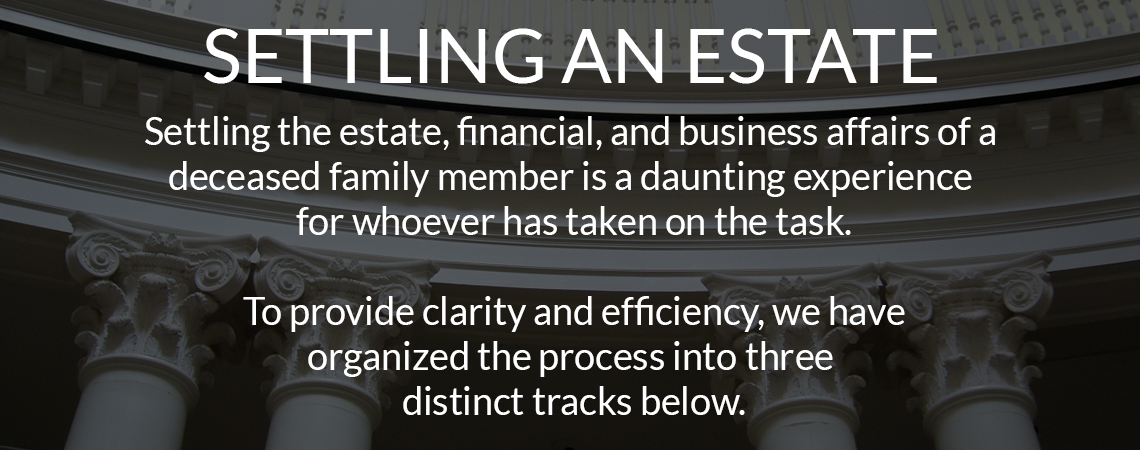
A person unfamiliar with settling an estate might think she has stepped into a labyrinth … and she would be right. There are federal tax rules and state probate laws that must be followed. And there are also unwritten rules that third parties, such as banks, insurance companies, and stock brokerage firms, often insist upon before they will agree to transfer assets out of a decedent’s name. The attorneys at Virginia Wills, Trusts & Estates and our experienced paralegal staff will walk you through the labyrinth, which will save you much frustration and emotional energy.
You can visualize the settlement of a decedent’s estate as a process that proceeds down three different tracks within the labyrinth.
1
COMPLY WITH
PROBATE SYSTEM
The first track involves complying with the probate system enacted by the Virginia General Assembly. This track is concerned primarily with following the orderly process established by state law for the transfer of assets from a decedent’s estate into the hands of the beneficiaries under the decedent’s will. This is what most people generally think of as probate:
- Recording the decedent’s will in the Circuit Court in the city or county where the decedent resided at the time of his or her death.
- Having the court certify (“qualify”) the appointment of the executor named in the will.
- Gathering together (known as “marshalling”) the decedent’s probate estate, and using those assets to pay the decedent’s debts and final taxes.
- Filing an inventory and annual accountings with the quasi-judicial officer known as the Commissioner of Accounts until the estate is closed.
- At the end of the process, paying out the decedent’s assets to the beneficiaries of the estate.
2
MARSHALL
ASSETS
The second track involves the marshalling of assets, including those that do not pass under the decedent’s Last Will and Testament. In many estates, the value of the non-probate assets (i.e., assets that do not pass under a decedent’s will) is considerably higher than the value of the assets being administered under the decedent’s will. Examples of non-probate assets include (i) assets that pass under beneficiary designations, such as life insurance and IRA proceeds, (ii) assets held in joint names with rights of survivorship, and (iii) investment accounts that pass under P.O.D. (payable on death) or T.O.D. (transfer on death) provisions instituted by a decedent before death. Even though an executor under a will may have no legal authority over these assets, it often falls to the personal representative to shepherd the transfer of these assets from the decedent’s name to the new owner.
3
FEDERAL AND STATE
TAX CONCERNS
The first two tracks involve the orderly transfer of assets from the name of a decedent into the hands of the ultimate beneficiaries. The third track has a very different focus. It involves the preparation and filing of federal and state tax returns. There are two taxes at issue in an estate and trust settlement: (i) taxes triggered by the transfer of wealth at death, normally referred to as the Federal Estate Tax, and (ii) taxes triggered by the income earned by an estate or trust during the period following a decedent’s death until the assets of the estate or trust have been completely distributed to the beneficiaries.
The federal estate tax is a tax on the transfer of wealth at death. Historically, federal tax laws have allowed a specific amount of a person’s estate to pass at death free of any estate tax. This amount is referred to in the tax law as the unified credit. Those same laws allow an individual to leave his estate to his spouse completely free of federal estate tax. This is known as the unlimited marital deduction. The per-person exemption from the federal estate tax has risen to almost $11.2 million (!) in 2018. This is a staggeringly large exemption, especially when you consider that at the beginning of this century the exemption was $1 million per person. Furthermore, through what is known as “portability,” which only became the law in 2013, a decedent’s surviving spouse may claim the unused exemption of his or her spouse. Thus with little tax planning, a married couple can transfer more than $22 million to their children or other loved ones free of federal estate tax. Since Virginia does not have an estate tax, for the vast majority of estates we help administer, federal estate taxes have ceased to be a concern.
That does not mean an executor has no tax concerns. Each estate or trust created at a decedent’s death is a brand new taxable entity. Almost every executor or trustee has to file an income tax returns for the estate or trust he is administering. This is much less onerous than the filing of a federal estate tax return, but it still an important responsibility that an executor or trustee ignores at his peril.
PROFESSIONAL HELP
Not surprisingly, most non-professional executors and trustees need professional help to navigate the three tracks and properly settle a decedent’s estate. At Virginia Wills, Trusts & Estates, we are competent to assist you with the administration of any estate involving the death of a Virginia resident or any estate where the decedent had assets, such as real estate, located in Virginia. Our experienced estate administration staff assists our clients in the estate and trust settlement process. We bill our clients on an hourly basis for these services. We are eager to help any executor or beneficiary or other loved one of a decedent who needs help in some aspect of the administration of an estate.